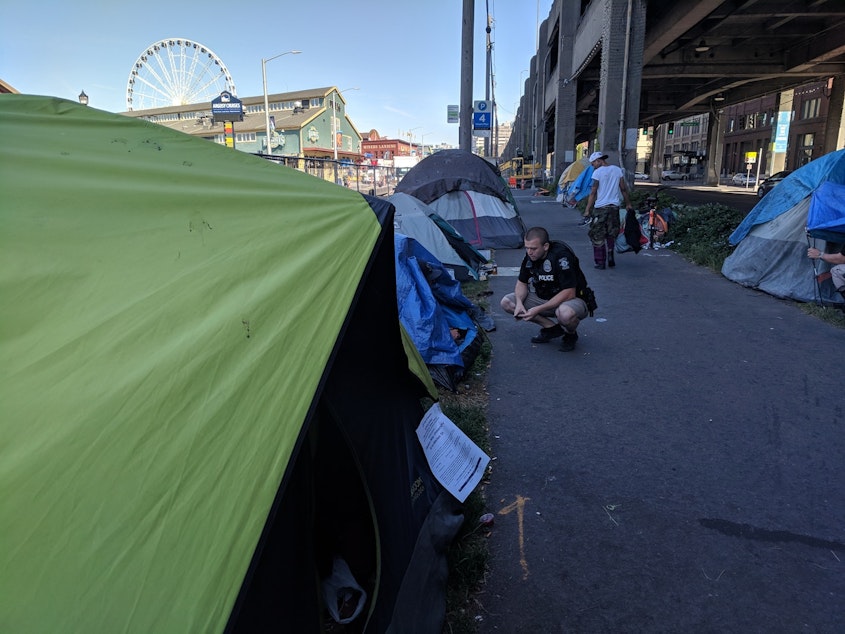Fragmented homeless services, no more. Seattle area to consolidate response

Officials in Seattle and King County say they plan to create a single, independent body to oversee the regional response to homelessness.
The current system spans multiple agencies and has been criticized as fragmented and inefficient. Earlier this year, a county auditor’s report stated “diffuse authority still hinders regional homeless response.”
A new report from consultants Future Laboratories and Corporation for Supportive Housing echoed this finding.
Following recommendations from the outside consultants, city and county leaders announced Wednesday that they’re committed to combining funding and policy-making under a new joint body.
Officials said consolidation would create clear authority and allow gaps in the system to be recognized.
"These reforms will not by themselves solve homelessness. But we must have a foundation that's data-driven, that is transparent, that is customer focused,” said King County Executive Dow Constantine. “We must have a single point of accountability for the region.”
Sponsored
Fragmentation of the homelessness response has long been an issue in the region. And the new report ties the fractured system to an inability to properly end the crisis.
It states: “Without substantial investments in affordable housing, the region will not end this crisis. However, these investments will be inadequately leveraged if programs and systems across the county maintain their current state of fragmentation.”
The current system spans at least six organizations and agencies. The report goes on to note that “six agencies cannot hold primary responsibility for the same thing.”
The process of putting homeless services under one roof won't happen quickly.
Details about how the new governing body will work, who will run it, and how resources will be allocated have not yet been decided. However, a press statement did lay out some of the areas the new body charged with addressing homelessness would be expected to cover.
• Unifying prevention and emergency funding and services including shelter, outreach, and diversion;
• Coordinating permanent supportive housing, transitional housing, and rapid rehousing;
• Overseeing policy, contract management, performance management, and technical assistance;
• Continuum of Care funding and functions required by the U.S. Department of Housing and Urban Development to receive federal funding;
• Clear metrics and milestones for measuring success and for accountability.
Seattle Mayor Jenny Durkan said both King County Metro and Seattle/King County Public Health are examples of regional authorities that already exist.
Sponsored
Although no exact implementation timeline has been released, city and county officials say they’ll be taking steps in the coming months, including co-locating staff, setting up central leadership and developing agreements so that the city and county can act together.
"We're going to be building this plane as we're flying it," Constantine said.
Durkan said the hope is that creating efficiency in the system will lead to better outcomes for people who are homeless. “If someone is in need of shelter and they’re in need of behavioral health, they have to go to two different windows,” Durkan said. “When someone needs help we don’t want to say you can get part of your help here, but walk across town to get the rest of the help and fill out forms.”
The consultant’s report also indicates that consolidation will help the region address racial disparities. Currently, people of color are vastly over-represented in the homeless service system.
Once the new entity is established, Durkan said the process of looking at deeper issues and root causes of homelessness can be elevated and, hopefully, reduce the overwhelming number of people becoming homeless each year.
Sponsored
Roughly 30,000 people needed help from homeless services in King County at some point in 2017.
Tens of millions of public dollars are spent responding to the homelessness crisis in King County each year.
Officials say the new approach has the support of providers, businesses and philanthropic groups.

